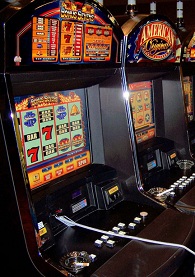Poker Addiction
Addiction comes in many forms – alcohol, drugs, sex, pornography; even coffee and chocolate. Where would we be without chocolate which some people cannot seem to live without?
chocolate which some people cannot seem to live without?
Hypnosis for Addiction to Pokies
What is it with poker machines that feeds the addiction?
I’m not a poker or slot machine player myself. Well, that’s not to say that I have never put money in a machine because I have lost small amounts of money on them. However, I was always too scared to put aside any more than about $10 maximum because that money was too hard to come by.
Even when I visited Las Vegas and lived there for a few months, the most I ever gambled at one time was about $40 in a section where you couldn’t lose because there were prizes for the losers! I think during the three months I was there I spent maybe $100 altogether on poker machines because they held no interest for me.
For me, poker or slot machines are boring. Truly, they bore me to tears and I would rather do a gazillion other things instead.
Having worked with clients who have been gambling addicts, there are a couple of interesting points that they make:
- Gamblers really love that feeling of anticipating a win and it is this anticipation that compels them to gamble, as much as being addicted to the rush of winning.
- They love to enter the zone, the zone where nothing else exists but mindless staring at the slot machine and watching for the big one. In this zone, there are no worries, no anxiety, no pressures, no stress, no nagging to do or be anything or anyone else. some gamblers describe the experience as hypnotic.
- They listen to their feelings that compel them to gamble and believe their feelings are accurate predictors of success. “I just know I’m going to win, I can feel it”. Occasionally a win occurs so this reinforces the belief and unfortunately there is no reality check when they lose so they don’t tell themselves “Uh oh, I lost all that money, so that feeling was unsubstantiated. I better give up gambling altogether.”
- There is often an associated dynamic of being with friends and/or drinking alcohol which enhances the feel of a winning drawcard. Gamblers are often drinkers and smokers so a lot of money is wasted at the one time.
- Many gamblers have a lot of debt so they are anxious about the debt and desperate for a big win to clear the debt. “I just need that one big one” and then I can give it away. Of course, that provides an opportunity to reinvest the win to go one bigger and better if the winner doesn’t leave the table or machine immediately.
- Gamblers may be anxious, depressed or stressed, or low in self-confidence and gambling may be an outlet which appears to enhance feelings of self-confidence and happiness.
- Any addiction includes obsessive thoughts as well as the accompanying compulsive behaviours.
- Many gamblers cannot stop even though they may have registered, and set a gambling limit.
- Many gamblers hide their problems, similar to any other addiction. In hiding their problems, they may also be secretive about gambling which gives a whole other thrill to the experience. There may be a different set of friends who appear to be non-judgemental and even supportive of addictive habits. This secretive behaviour may also include hidden bank accounts or lying about money being withdrawn from an account for daily expenses, not gambling.
Here are some facts on the cost of gambling
(from an Australian government webpage)
- The social cost to the community of problem gambling is estimated to be at least $4.7 billion
- One in 6 gamblers has a serious gambling addiction
- In 2008-2009 gamblers spent around $12billion on pokies
- Problem gambling negatively impacts on around 5 to 10 other people
- Problem gambling affects relationships
- Read more on the cost of gambling at http://www.problemgambling.gov.au/facts/
Treatment and therapy for pokie addiction
Hypnosis for Poker Machine Addiction
Treatment for any gambling addiction may follow several different pathways, or a combination of one or more.
- For example, attending a programme for problem gambling run by a local organisation and attending Gamblers Anonymous and following the 12 Step program, similar to Alcoholics Anonymous.
- Cognitive Behavioural Therapy would look at thought patterns and how the person interprets thoughts and then acts on them. By doing this, thoughts can be rescripted and different behaviours can be installed. For example, is it a response to stress and if so, how can stress be managed differently?
- Psychotherapists would look at the likely causes of the addictive behaviour. Are there unresolved childhood issues? Was it an act of rebellion? Is there something missing from life that temporarily seems to be replaced by gambling?
- Positive Psychology would look at the strengths displayed such as focus and dedication, and how these positive traits can be transferred to another more positive area of life.
- Hypnosis and/or Timeline Therapy may be utilised to encourage change at a sub-conscious level which is where many therapists would say the addictive behaviour has its roots.
The problem of pokie addiction is enormous and its consequences are far-reaching when either the gambler or the families lose their home, life savings, credit rating, their self-esteem and self-worth. It is not only the gambler who suffers, it is their loved ones as well. Seeking treatment and admitting to a pokie or gambling addiction is the first and best step on the road to recovery.


